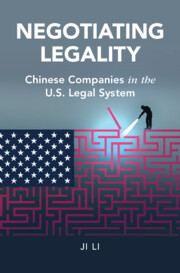Book contents
- Negotiating Legality
- Cambridge Studies in Law and Society
- Negotiating Legality
- Copyright page
- Dedication
- Contents
- Figures
- Tables
- Acknowledgments
- Introduction
- Chapter One Chinese Companies in the US Legal System
- Chapter Two In-House Legal Managers of Chinese Companies in the United States
- Chapter Three Chinese Companies and Their US Lawyers
- Chapter Four US Litigation by Chinese Companies
- Chapter Five Chinese Companies in US Federal Courts
- Chapter Six Chinese Companies’ Legal Strategies against US Government Mistreatment
- Conclusion
- Index
- Cambridge Studies in Law and Society
Chapter Three - Chinese Companies and Their US Lawyers
Published online by Cambridge University Press: 13 June 2024
- Negotiating Legality
- Cambridge Studies in Law and Society
- Negotiating Legality
- Copyright page
- Dedication
- Contents
- Figures
- Tables
- Acknowledgments
- Introduction
- Chapter One Chinese Companies in the US Legal System
- Chapter Two In-House Legal Managers of Chinese Companies in the United States
- Chapter Three Chinese Companies and Their US Lawyers
- Chapter Four US Litigation by Chinese Companies
- Chapter Five Chinese Companies in US Federal Courts
- Chapter Six Chinese Companies’ Legal Strategies against US Government Mistreatment
- Conclusion
- Index
- Cambridge Studies in Law and Society
Summary
With or without professional in-house counsel, Chinese companies must rely heavily on outside lawyers to effectively manage legal risks in the United States. Companies operating in the United States must navigate through an intricate web of legal rights and obligations, which cannot be done without adequate legal assistance. While a vast literature has accumulated on the US legal profession and the legal service market, few scholars have studied the interactions between multinational companies and their US lawyers, leaving important questions open. For instance, do Chinese companies bring their lack of appreciation or even contempt for lawyers and legal services to the United States, or do they adapt to the host-state environment and take legal advice seriously? Moreover, how do Chinese companies choose from the 1.3 million US lawyers? Are Chinese companies becoming a significant revenue source for US law firms, which will give them pricing power in the market and the ability to dictate how legal services are provided? Do their lawyer selection preferences and legal expenditures vary across different Chinese companies, and if so, what institutional and firm-specific factors may explain the variations? This chapter answers these crucial yet unexplored questions within the dual institutional framework.
Keywords
- Type
- Chapter
- Information
- Negotiating LegalityChinese Companies in the US Legal System, pp. 82 - 123Publisher: Cambridge University PressPrint publication year: 2024

